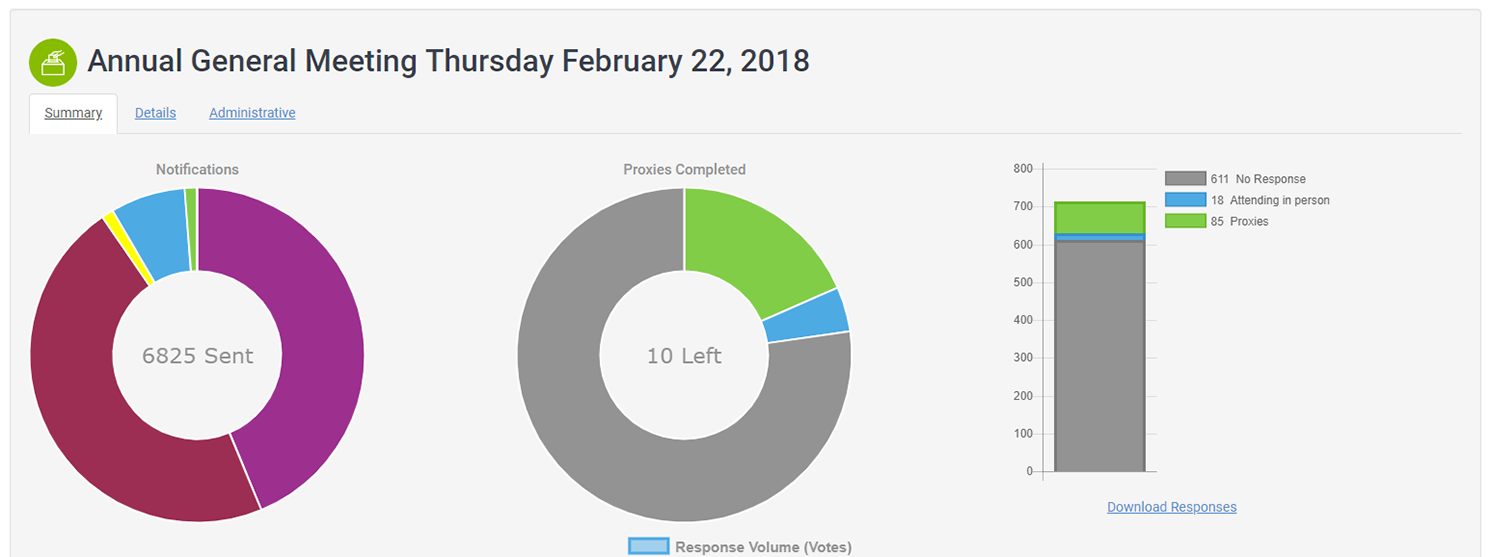To hold a valid meeting, condo associations need a quorum. What’s a quorum, you ask? A quorum is the minimum number of unit owners that must be present either in person, electronically or by proxy for a valid meeting to take place.
This is to ensure that proposals are fairly considered including governance issues like insurance coverage and claims, director elections, bylaw amendments, etc.
In the following article, we’ll explore how proxies can help condo boards achieve a quorum and successfully conduct meetings. Read on for more.
What is a quorum?

A quorum is the number of unit owners who must be present before a meeting can begin. The minimum number for each association primarily depends on state law and the association’s declaration. Although it’s usually a low number, it can still be tough to meet.
Most associations adhere to the 10 – 20% quorum requirement range, especially for annual meetings. If there are no special quorum requirements addressed in the association’s governing documents and state statutes don’t provide guidance on the issue, the quorum requirement defaults to 51%.
The purpose of having a certain quorum percentage is to ensure that decisions made in a meeting are legal and binding. That’s why no association business can be legally conducted if a quorum is not present. For instance, if board elections happen without a quorum then they can easily be challenged as improper.
What happens if an association board doesn’t have a quorum?
Unfortunately, if a meeting doesn’t have a quorum then it must be postponed for a later date. This is a costly exercise which adds to the administrative burden of the association. Plus, getting a quorum at a second meeting is even tougher than getting a quorum the first time.
However, the board must keep trying because they’re obligated to hold an annual general meeting. The annual meeting is a necessity because that’s when board elections take place and the association board presents the yearly budget to unit owners for authorization.
If there’s no quorum, the meeting cannot proceed. This means there will be no budget allocations and no elections. This forces the current board to continue until the next election.
What is a proxy?
When you purchase a condo in an association-managed property, you become a stakeholder in that community. This means you have the right to attend and vote at association meetings. You’re also eligible for election to the board. However, if you’re unable to attend your condo’s AGM (Annual General Meeting) for whatever reason, you may appoint a proxy to attend and vote on your behalf.
A proxy is a person who takes the place of a unit owner at a meeting. You can appoint someone to be your proxy by filling out a proxy form and Whoever you pick should have the authority to act and vote on your behalf unless the governing documents prohibit that.

With technology’s like online E/Proxy voting, you can reach quorum quicker while staying within the condominium authority bylaws.
Most associations have a standard proxy form which designates the secretary as a proxy for people who’re unable to attend board meetings and have no-one to stand in for them.
There’s usually also a section for people who don’t want the secretary to be their proxy. This gives them an opportunity to choose a specific person who they want to represent them at the meeting.
A legal proxy document must specify the date on which the unit owner signed it, and it must have their name and signature clearly printed.
It’s important to note that if you want to vote for a new board or policy, you need to spell that out on the proxy form and sign your name beside it.
But, appointing someone as a proxy may not be enough to get the desired outcome. It all depends on the number of people who vote on the issues you’re most passionate about.
For instance, voting to remove a condo board member needs at least 50% of the unit owners to agree, while amending the condo declaration typically requires 80% of the owner’s written consent. These are some huge numbers that are incredibly hard to achieve for most associations.
But, if a large majority of the unit owners are present at the meeting, it’s possible to hold productive meetings and take decisive action on important issues. That’s why proxy voting is so important.
Proxy Voting
It’s important for the condo association board to hear from everyone when conducting meetings. And as a condo unit owner, your inputs have a tremendous impact on the condo board’s decision-making process. Resolutions made at meetings also affect you when it comes to the management and maintenance of the building itself.
The proxy voting process allows unit owners to voice their views at annual Condo Association Meetings without being physically present. Thanks to modern technology, unit owners can also vote by proxy through convenient solutions such as telephone or online proxy voting.
Not only can you use proxy voting to take part in the association’s annual general meeting but also in requisition meetings. It’s a convenient solution that allows you to attend association meetings without being physically present.
Through the proxy form, you’ll be able to specify whom you want to vote on your behalf. Basically, the proxy form allows you to temporarily transfer your vote in writing to another person, and it adds to the quorum.
Votes on proposals are tabulated at association meetings and their outcomes can be announced via the association’s newsletter and/ or online notice board.
Different proxies
When assigning a proxy, association members need to choose between:
– Directed proxy: Here, the proxy holder has a right to vote on behalf of the unit owner, but the unit owner selects the specific issues that they want the proxy to vote on.
– Non-directed proxy: The proxy holder helps to make up the quorum so the meeting can proceed, and they can vote on whatever issues are on the meeting’s agenda.
As you can see, planned communities work much the same as governing entities and corporations.
Who should you pick as a proxy?
States laws or governing documents might dictate who can serve as a proxy holder. However, if that’s not the case, you can pick anyone, from a tenant, a friend, family member or even a neighbor. You can even pick a board member if you like, so long as it’s someone you trust. Whichever choice you make the proxy will be valid for 11 months from the date of issuance.
What if a unit owner has a change of mind?
It’s not uncommon for unit owners to revoke a proxy either in writing or by attending the meeting in person. However, showing up to a meeting isn’t enough to revoke the proxy. The unit owner must also cast a ballot that reflects their new choice. Also, if the unit owner issues multiple proxies, only the latest one is valid.
Condo association meetings explained
The first thing that happens at association meetings is to call the meeting to order. Doing so eliminates any side talk or chatting that’s happening in the meeting room so people can get ready for the business at hand.
Once the meeting has been called to order, the secretary does a roll call. This doesn’t mean reading everyone’s name so they can state their presence. The secretary can simply go through the list of unit owners to see who’s present and who’s absent from the meeting. Afterward, the secretary will declare whether there’s a quorum so the meeting can begin.
Once the roll call is taken, the meeting can move on to the approval of the agenda. This is when the board chairman will ask for a motion to approve the agenda. If an item needs to be added or taken off this is the time to do it.
Any changes made to the agenda must be voted into the agenda by a majority of the attendees before the meeting start. Once the agenda is approved, you can move onto approval of minutes from the previous meeting. They’re notes taken by the secretary and submitted by the board.
From there, the meeting will proceed to the reports section. Committee reports include any standing committees within the board such as the finance committee, maintenance committee, etc. This is an opportunity for the committees to bring unit owners up to speed on the goings-on within the association.
As you go through each of these sections, the board must allow unit owners to ask questions for further clarity before moving onto the business of the day and this is where proxies come in handy. Assigning a proxy helps to maintain your interests while allowing the meeting to move forward with reduced absenteeism.
Conclusion
The proxy voting process is a great way to ensure that condo association meetings proceed as planned. There’s nothing worse than having to reschedule an important meeting because there aren’t enough people to make a quorum. This can slow down the association’s progress and it affects the budget, governance issues, maintenance, and even insurance!
It’s in everyone’s interest for unit owners to appoint a proxy so you have someone to vote on your behalf if you can’t make your AGM.
Online E-Voting
Achieve Quorum on The First Attempt























